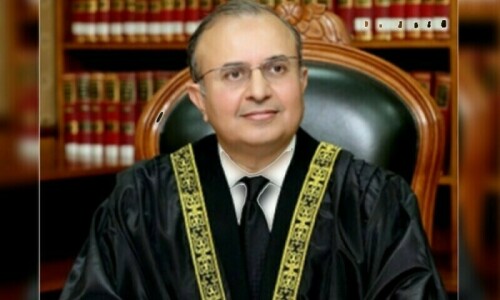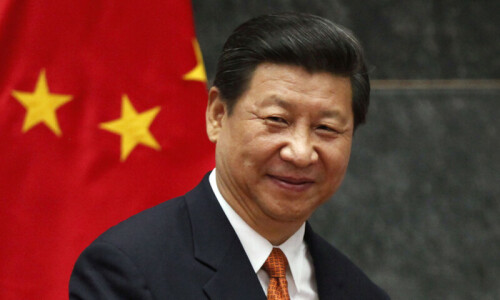SOME called it a revelation. “There are different groups which form the TTP and some of them want to talk to our government for peace,” the prime minister told an interviewer. “So, we are in talks with them. It’s a reconciliation process.”
The news wasn’t quite new: the foreign minister had said much the same thing days ago, the president a month before that, with the establishment signposting it all along.
It nonetheless sparked a debate: critics slammed the centre for not bringing in parliament, for talks not being extended to Baloch separatists, and for disrespecting the lives lost to insurgency.
Read: Families of APS attack victims oppose amnesty to TTP
Supporters shrugged this off: if the Americans can talk to the Afghan Taliban, they said, Pakistan can talk to the TTP; military solutions are never the answer; and this was all the fallout of the ‘Bush-arraf’ wars anyway.
Much of the story we tell ourselves is inaccurate.
It’s an important debate to be having. But we’d also do well to focus on what the TTP is, and how it’s responded to talks in the past.
For starters, conflating the TTP with the Afghan Taliban has been useful for both the pro-war and anti-war brigades. Many in the pro-war camp wanted to turn all of Pakistan into a staging ground for the occupation next door, and wave in drone strikes and donor money.
But many in the anti-war camp wanted to cede Swat to TNSM and the Waziristans to the TTP, offer office space, and dub them a resistance instead of what they were: racketeers and murderers.
It thus suited both camps to treat the insurgency in Pakistan as a perfect extension of the war in Afghanistan. It wasn’t.
To be clear, the Afghan Taliban have never gone against the TTP. They had zero interest in cracking down on them during the war, thinking the TTP a needless enemy in addition to American troops, the Afghan army, ageless warlords and IS-Khorasan (many of whom were ex-TTP fighters).
Pakistan’s reluctance to treat both the Afghan and Pakistani variants the same way was rooted in similar apprehensions: that approach saw the US lump together Al Qaeda (international jihadis) with the Islamic Emirate (Deobandi theocrats), and then drown in a war of all against all.
At the same time, that distinction also applies to these talks. To say Pakistan should talk to the TTP since the Americans talked to the Afghan Taliban misses the obvious: Pakistan was never occupied. Not least, the talks failed and the Taliban won — hardly the happiest of comparisons.
That also brings us to the insurgency in Pakistan itself. The story we tell ourselves starts with 9/11: the war in Afghanistan began, Musharraf went too hard into the tribal areas, a revolt morphed into an insurgency, Pakistan went too soft on the insurgents, and a series of kinetic ops culminating in Zarb-i-Azb finally beat them back.
Much of this is inaccurate. As scholar Ibrahim Moiz has pointed out, anti-Pakistan militancy existed well before 2001, and much of it was from our side of the Durand. These included sectarians in Punjab and Karachi, extremists with political ambitions like Sufi Muhammad in Swat, and fighters that fought alongside Afghan groups from Hizb to Jamiat.
These outfits predated the Taliban, to say nothing of the TTP: Al Qaeda was trying to assassinate Benazir as early as 1993, Sufi Muhammad and the TNSM had besieged Swat by 1994, and sectarian carnage had driven Nawaz to set up anti-terrorism courts in 1997.
As for the TTP itself, Lal Masjid — in the heart of Islamabad — was more central to its birth than any foreign front ever was. In the year since the Lal Masjid operation, the TTP announced its formation, seven Fata agencies fell, Swat was consumed, and military and intel installations attacked for the first time.
Doubtless, the war on terror turbo-charged our insurgency. But two things can be true at the same time: that Bush’s crusades were not our war, and that Pakistan’s insurgency was always headed our way.
The lesson of that insurgency is also clear: the TTP only reconciles to regroup.
Baitullah lied about assassinating Benazir; his deputy admitted to it later. Fazlullah lied about the Swat deal, and then took Buner. The TTP lied about the ceasefire, and then its offshoot razed Islamabad’s district courts. Even now, it’s ramping up attacks while rejecting amnesties.
Historically speaking, the TTP has only understood punitive measures — not Imran Khan being nominated to their negotiation team, nor Shehbaz Sharif asking they leave Punjab alone.
Finally, talks imply a give-and-take. But there can be no give, no reconciliation, with the killers of children. That’s not an emotional appeal: it goes to the heart of the rule of law in this country. For those of us coming of age around that time — the waves upon waves of suicide bombings — Pakistan fought the war of its life.
It’s also why some things aren’t that complicated. Either the TTP surrenders, or Pakistan does.
The writer is a barrister.
Published in Dawn, October 10th, 2021















































